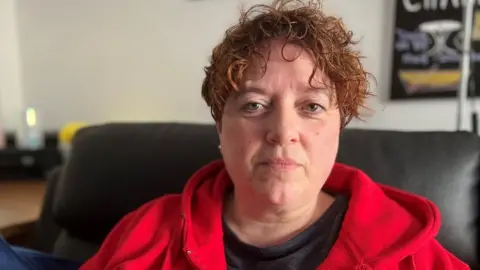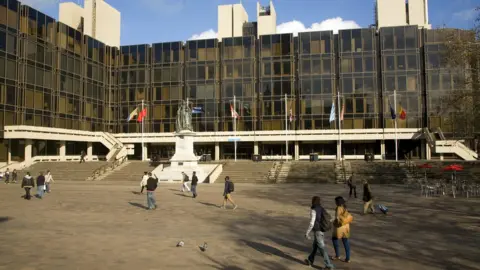Portsmouth mum of autistic teen: 'What's the point in voting?'
 BBC
BBCFor parents of children with special education needs and disabilities (SEND), their council is a lifeline.
You might think that would make them more likely to vote, but that is not necessarily the case.
Helen Barter, who runs the Stand Up Portsmouth SEND family support group, says: "Really, what's the point?"
Her daughter is 15 and has severe autism but she says in the past 10 years she has gotten used to "fighting for services" she is entitled to.
She has seen different parties leading the council in that time but says provision has got worse.
"I have voted in council elections for years but I'm very doubtful I will bother this year, because what's the point?" she told BBC News.
"It's disheartening when you hear people in political life saying what they can do for this group and that group. We are glass half-empty because we're always being let down."
Children's social care is one of the biggest expenditures of unitary authorities.
Portsmouth has plans to spend £70m on children, families and education in the financial year 2024-25 - nearly a third of its total budget.
 Getty Images
Getty ImagesThe council said it saw a 30% increase in requests for Education, Health and Care Plans (EHCPs) in 2022-23 and it is seeing significant and growing pressures on its specialist places.
Ms Barter says all politicians need to show more empathy and understanding.
"If they are not living a life with a SEND child, they can't really understand what it is like. The people who are making choices about how much money different groups get need to talk to parents about what they want," she said.
What do the parties in Portsmouth say?
Steve Pitt, leader of the Liberal Democrat group, said: "Obviously councils want to do their best, especially for families with children with SEND, it's a top priority for us and we work really hard to support those families, but with an ever decreasing amount of financial resources available to us, it's challenging to be able to respond as rapidly as we need to and we are seeing an explosion in the need for that provision after the pandemic."
Conservative group leader Simon Bosher said: "I have total sympathy as I have a grandchild who has special educational needs. I know first hand the frustrations of trying to integrate into mainstream education - he does well but getting him help has been difficult. I think improving this does mean funding support from a national government too as well as some improvements locally."
Labour's Charlotte Gerada said her party had "centrally committed to supporting inclusion in mainstream schools" but also "keeping specialist provision available".
"We need more training, better conditions for teachers and TAs, improving school resources and strengthening accountability for parents when things don't always go to plan," she added.
The Portsmouth Independents Party's George Madgwick said: "Our council is one of the worst performing in primary education in the country and the education department is not being run effectively or properly, so we need to revitalise the department and look to improve results but also provision for SEND children."
Green Party candidate Elliott Lee said: "The pressures faced in social care is a political choice. SEND is too focussed on the healthcare model and the diagnosis of young people with disabilities.
"We should be thinking about the social needs of young people with disabilities. And that's not always the cheapest model, but it's the option that means that young people can thrive whether that be in the classroom, in the playground or whilst at home."
A total of 14 of the 42 seats on Portsmouth City Council are up for election on Thursday - with the council currently controlled by a minority Liberal Democrat administration, which holds 18 seats.

Follow BBC South on Facebook, X, or Instagram. Send your story ideas to [email protected] or via WhatsApp on 0808 100 2240.
